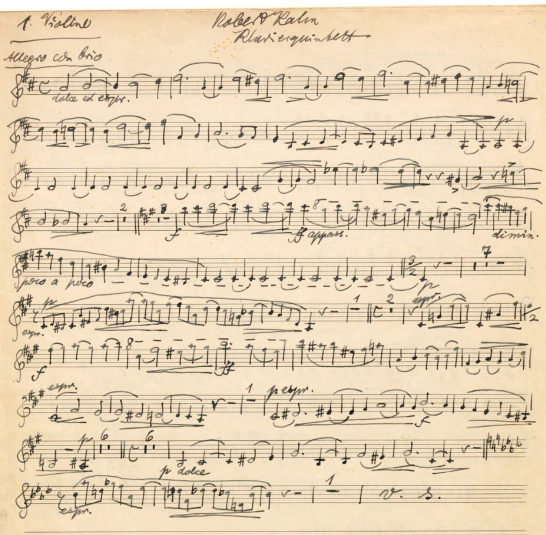Presents
Robert Kahn
Piano Quintet in D Major-World Premier Edition
 Kahn's
Piano Quintet in D Major dates from 1926. The manuscript to the work resides in
the Academie der Kunst in Berlin where Kahn taught for many years. We have
reproduced the first page (pictured on the left) of the manuscript, a copy of
which we were able to obtain to make our world premier edition. It is not clear
why Kahn, who was 61 at the time he finished the work and at the height of his
fame, never chose to have it published. Perhaps, it was because he felt that in
light of the developments after the First World War, the music he was composing
was dated and no longer relevant. The work is in three movements and in the
style of the late Romantic era. It could just as easily have been composed
between 1890 and 1910. The opening movement, darkly hued and passionate Allegro
con brio, is full of lovely melodies. The middle movement, a lop-sided Vivace,
has a vaguely oriental dance-like feel to it caused by the accents on the off
beats. A contrasting middle section provides a nice lyrical contrast. The big,
magnificent finale is in several sections and is as long as the two preceding
movements put together. It is music of many moods and is by turns gentle, almost
pastoral, then lively, later becoming wild, then lyrical, then dark and brooding
and then mysterious, but later upbeat, jovial and finally triumphant. The
sections are Andante con moto, Allegro, Allegro grazioso, Allegro non troppo,
Allegretto con motto, Allegretto moderato and finally a big Moderato.
Kahn's
Piano Quintet in D Major dates from 1926. The manuscript to the work resides in
the Academie der Kunst in Berlin where Kahn taught for many years. We have
reproduced the first page (pictured on the left) of the manuscript, a copy of
which we were able to obtain to make our world premier edition. It is not clear
why Kahn, who was 61 at the time he finished the work and at the height of his
fame, never chose to have it published. Perhaps, it was because he felt that in
light of the developments after the First World War, the music he was composing
was dated and no longer relevant. The work is in three movements and in the
style of the late Romantic era. It could just as easily have been composed
between 1890 and 1910. The opening movement, darkly hued and passionate Allegro
con brio, is full of lovely melodies. The middle movement, a lop-sided Vivace,
has a vaguely oriental dance-like feel to it caused by the accents on the off
beats. A contrasting middle section provides a nice lyrical contrast. The big,
magnificent finale is in several sections and is as long as the two preceding
movements put together. It is music of many moods and is by turns gentle, almost
pastoral, then lively, later becoming wild, then lyrical, then dark and brooding
and then mysterious, but later upbeat, jovial and finally triumphant. The
sections are Andante con moto, Allegro, Allegro grazioso, Allegro non troppo,
Allegretto con motto, Allegretto moderato and finally a big Moderato.
Robert Kahn (1865-1951) was born in Mannheim of a well-to-do banking family. He began his studies at the Hochschule für Musik in Berlin. There, he got to know and became friends with Joseph Joachim who was the director. It was through both Joachim and his own family that he had a chance to get to know Brahms, who was so impressed with Kahn that he offered to give him composition lessons. However, Kahn was too overawed to accept. Nevertheless, Brahms did help Kahn informally, and while Kahn's work does, to some extent, show the influence of Brahms, he is an eclectic and independent composer whose music has its own originality. After finishing his studies in Berlin, Kahn, on Brahms' suggestion, went to Munich to study with Joseph Rheinberger. After completing his own studies, he worked for a while as a free lance composer before obtaining a position at the Hochschule in Berlin where he eventually became a professor of piano and composition.
What a tremendous pity that a work so fine never received publication until now. It deserves to be in the concert repertoire and professional ensembles which present it will surely be rewarded by the audiences who get to hear it. Experienced and competent amateurs will also get much enjoyment from it.
Parts: $44.95